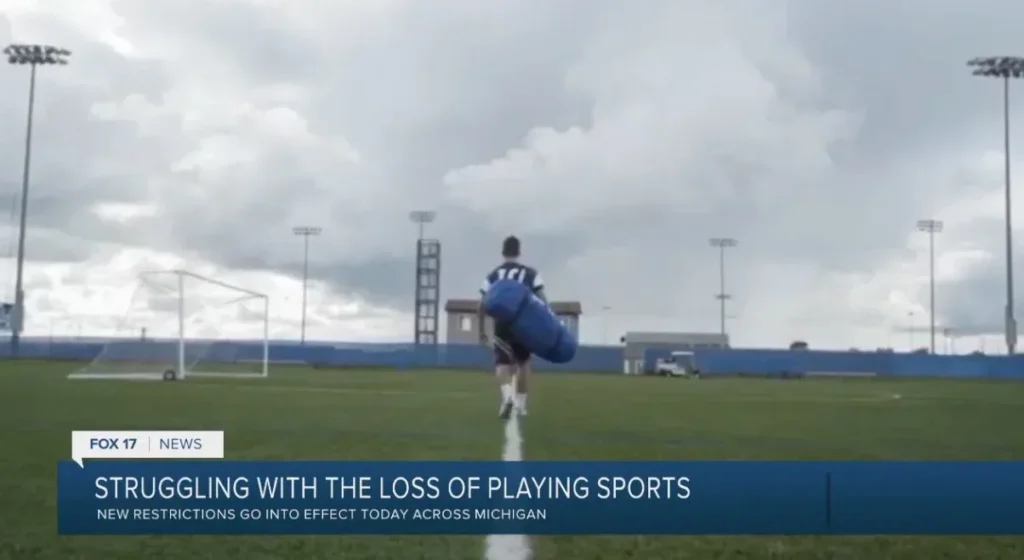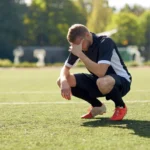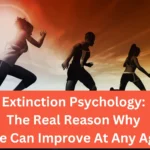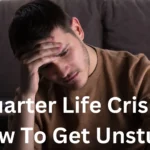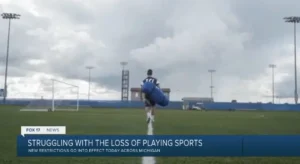 Dr. Eddie O’Connor talked with Mike Avery of Fox 17 West Michigan and discussed the difficult time athletes are having as they cope with the loss of a season to COVID-19. Click here to view the full interview.
Dr. Eddie O’Connor talked with Mike Avery of Fox 17 West Michigan and discussed the difficult time athletes are having as they cope with the loss of a season to COVID-19. Click here to view the full interview.
As the state health department’s new COVID-19 restrictions kick in here in Michigan, high schools and colleges are back to remote learning. Their sports programs have been shelved; some temporarily and others for the season.
Just two days ago, Grand Valley State University canceled its upcoming 2021 campaign, and it’s not the first time. The Grand Valley State Men’s Lacrosse team has had plenty of success over the years, including a national championship back in 2014.
But times have changed, and our country is in the midst of a pandemic which forced the Lakers to end their spring season after just three games.
“You’re undefeated, we ranked top five, and we had national title aspirations and everything got cut short and so we’re just kind of geared towards this year. You just kind of feel gutted with the announcement of the cancellation of the upcoming spring season,” said Tim Murray, the head coach of the men’s lacrosse team at GVSU.
Sports Psychologist Eddie O’Connor understands it. He sees athletes all the time who are struggling with the loss of a season to COVID-19, especially the seniors.
“So for those athletes and the people around them, I say we really have to let them grieve, it’s very important to not try to make it better, or look at the bright side, or any of those things that we know don’t work, that just aggravate us. Really give people space to comprehend the loss and to feel it,” said Dr. O’Connor.
He says some athletes may start to look within themselves and question why they train during modified or cancelled seasons.
“They almost have an automatic response like, ‘well, this is what I do, this is who I am so I should just keep doing it no matter what.’ Sometimes they ask ‘what am I doing here?’ and so I help explore that great question and ask them, ‘What is your identity and motivation to keep training? Is it worth it, or do you want to invest in other things?’ It helps athletes feel more in control and respond adaptively,” Dr. O’Connor said.
He says this is a great opportunity for coaches to connect with their players.
“Really, the main thing that you can do, and athletes say this over and over again, is talk to us like human beings. Recognize that we’re not just your point guard, you know, but we have a life. If the coach could ask specific questions like ‘how are your grades?’, or ‘what’s going on with your parents?” That is by far the best thing that you can do … be present in their daily life. And if you notice there is a change in their personality, ask about it to see if they need some help.”
It’s something Coach Murray has been doing at GVSU for years.
“As frustrated and as disappointed as I may be right now, at the end of the day, what’s best for these student athletes is what I’m most concerned with. You know, we may not have the opportunity to compete for a national championship like we’re hoping for this year but that’s not the end all be all of what we’re doing here,” Coach Murray said.
If there are parents or athletes out there who need someone to talk to like Dr. Eddie O’Connor, you can find him more information at dreddieoconnor.com/telehealth-services.
